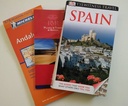
Spanish Language Game: Un billete por favor
Spanish Language Game "Un billete por favor" (One ticket please)
Play this quick online Spanish game and learn and practice 12 Spanish words and phrases in the form of a mini-story.
At the train station in Barcelona, David buys at train ticket to Granada.
This brief episode is also part of our Spanish 1 course, which is made up of mini-stories that tell of David's travels in Spain.
In the Spanish 1 course you learn and practice 750 basic words. (The full course is available for FREE by registering HERE.)
Improve your pronunciation by always saying the Spanish OUT LOUD after the speaker.
Click on the Spanish sentences to hear them again.
You'll hear the story at the beginning, and then again at the end. As much as you can, try to understand the Spanish without translating.
Once you're outside of the big cities in Spain, it's very useful to know how to buy a ticket in Spanish.
Words in Spanish Mini-Story Language Game
- miércoles - Wednesday
- la tía - the aunt
- ella lleva a David - she takes David
- a la estación de tren - to the train station
- en la ventanilla de billetes - at the ticket window
- él dice - he says [decir]
- un billete de clase turista - a tourist class ticket
- ¿Ida o ida y vuelta? - One-way or return?
- sesenta y dos - sixty-two/ 62
- setenta - seventy/ 70
- su vuelta - your change (money)
- de ocho euros - of eight euros
Please share us with your friends who also want to learn Spanish, or Italian, German, or French.
More than a Spanish Language Game
If you like our Spanish games, you can practice Spanish - online and completely for Free - with our 36-Scene story "David en España" by just logging in, or registering HERE.
You can find more resources for learning and practicing Spanish on FREELANGUAGE.ORG.
Our FREE Spanish 1 course will let you learn and practice Spanish playfully - with a travel-story of a young man in Spain and easy games.

Spanish Language Game: IR - Present Tense
Quick Spanish Language Game: ir (to go) - present tense
Level: Beginner (A1)
Playing Time: 4 minutes
Play this interactive online game to learn and practice the present tense of this often used irregular Spanish verb for "to go".
Learn the individual present tense verb forms and then put them into the context of short and easy sentences. You'll also practice how to use "al" and "a la" - both meaning "to the".
Before you tackle the other tenses you want to be sure have the present tense well memorized!
Note: pronouns (yo, tú, él, etc.) are often dropped in Spanish, except when they are needed for clarity or emphasis.
In this game, however, we include them.
Present Tense of the Irregular Verb "ir"
• yo voy - I go
• tú vas - you go (familiar)
• él, ella va - he, she goes
• Usted va - you go (formal)
• nosotros/as vamos - we go (m/f)
• vosotros/as vais - you go (pl, m/f) [Spain]
• ellos/as van - they go (m/f)
• Ustedes van - you go (pl) [Latin America]
More than a Spanish Language Game
If you like our Spanish games, you can practice Spanish - online and completely for Free - with our 36-Scene story "David en España" by just logging in, or registering HERE.
You can find more resources for learning and practicing Spanish on FREELANGUAGE.ORG.
Our FREE Spanish 1 course will let you learn and practice Spanish playfully - with a travel-story of a young man in Spain and easy games.

Spanish Language Game: Opposite Words
Quick Spanish Language Game: Opposite Words
Look at the list below, then play this quick online game to test yourself.
With this game, you learn 12 common Spanish words and identify their opposites.
Words in Spanish Language Game
primera - última [first - last (f)]
largo - corto [long - short (m)]
joven - viejo [young - old (m)]
fácil - difícil [easy - hard]
barato - caro [cheap - expensive (m)]
bueno - malo [good - bad (m)]
abrir - cerrar [to open - to close]
buscar - encontrar [to look for - to find]
continuar - terminar [to continue - to end]
llegar - depart [to arrive - to depart]
preguntar - contestar [to ask - to answer]
comprar - vender [to buy - to sell]
More than a Spanish Language Game
If you like our Spanish games, you can practice Spanish - online and completely for Free - with our 36-Scene story "David en España" by just logging in, or registering HERE.
You can find more resources for learning and practicing Spanish on FREELANGUAGE.ORG.
Our FREE Spanish 1 course will let you learn and practice Spanish playfully - with a travel-story of a young man in Spain and easy games.

Spanish Language Game: ¿Vienes?
Spanish Language Game "¿Vienes?" (Are you coming?)
Learn and practice 16 Spanish words and phrases in the context of a brief story.
David and his cousin María go to the Paseo de Gracia, a well-known shopping street in Gracia, one Barcelona's trendiest neighborhoods.
This brief story also shows up in our Spanish 1 course, which is made up of a series of such mini-stories. In the course you play short games to learn and practice 750 basic Spanish words. (You can play the full Spanish 1 course for FREE by registering HERE.)
Always repeat or say the Spanish words, phrases, and sentences OUT LOUD together with the native speaker. That way you'll dramatically improve your pronunciation. To hear the Spanish sentences again just click on them.
Words in Spanish Mini-Story Language Game
- ¿vienes? - are you coming? (familiar)
- conmigo - with me
- ¿Adónde? - Where to?
- tengo que - I have to [tener]
- comprar - to buy
- algo - something
- ¿qué? - what?
- ¿Qué es eso? - What is that?
- nuestra - our (f)
- conocida - well-known (f)
- la calle de compras - the shopping street
- voy - I go, I'm going [ir]
- contigo - with you (familiar
- después - afterwards
- vamos a tomar - let's go have
- algo de beber - something to drink
Note: Personal pronouns (yo, tú, él, ella, etc) are often dropped in Spanish unless they are needed for clarity or emphasis.
Please share us with your friends who also want to learn Spanish, or Italian, German, or French.
More than a Spanish Language Game
If you like our Spanish games, you can practice Spanish - online and completely for Free - with our 36-Scene story "David en España" by just logging in, or registering HERE.
You can find more resources for learning and practicing Spanish on FREELANGUAGE.ORG.
Our FREE Spanish 1 course will let you learn and practice Spanish playfully - with a travel-story of a young man in Spain and easy game.

Spanish Language Game: Extraordinario
Spanish Language Game "Extraordinario" (Extraordinary)
Learn and practice 16 Spanish words and phrases as part of a mini-story.
The context: David and his cousin María walk around Barcelona.
This mini- story is also in our Spanish 1 course, which takes you through a series of brief stories.
In the course you learn and practice 750 basic Spanish words. (You can play the full Spanish 1 course for FREE by registering HERE.)
If you repeat (or anticipate) the Spanish OUT LOUD every time, your pronunciation and intonation will improve dramatically.
To hear the Spanish sentences again just click on them.
Words in Spanish Mini-Story Language Game
- el próximo día - the next day
- el sábado - the Saturday
- la escuela - the school
- no tiene - s/he doesn't have [tener]
- quiere - s/he wants [querer]
- enseñar - to show
- están caminando - they're walking [caminar]
- alrededor - around
- el nombre - the name
- la iglesia - the church
- cuál - which, what
- el arquitecto - the architect
- se llama - his/her name is
- el edificio - the building
- realmente - really
- extraordinario - extraordinary (m)
Note the sentence: "Ella quiere enseñarle Barcelona a David". Literally: "She wants to show him Barcelona to David" (where "him" also refers to "David").
This is the doubling of the indirect object, typical for Spanish. (The direct object of the sentence is "Barcelona".)
Note also: Personal pronouns (yo, tú, él, ella, etc) are often dropped in Spanish unless they are needed for clarity or emphasis.
Please share us with your friends who also want to learn Spanish, or Italian, German, or French.
More than a Spanish Language Game
If you like our Spanish games, you can practice Spanish - online and completely for Free - with our 36-Scene story "David en España" by just logging in, or registering HERE.
You can find more resources for learning and practicing Spanish on FREELANGUAGE.ORG.
Our FREE Spanish 1 course will let you learn and practice Spanish playfully - with a travel-story of a young man in Spain and easy games.
